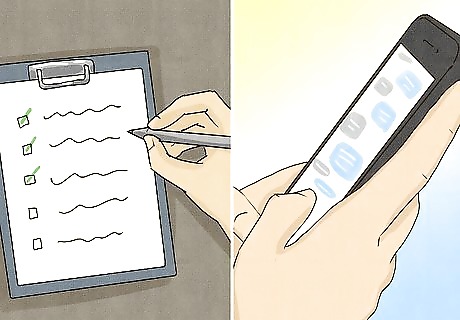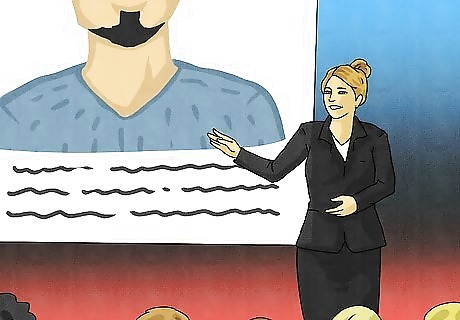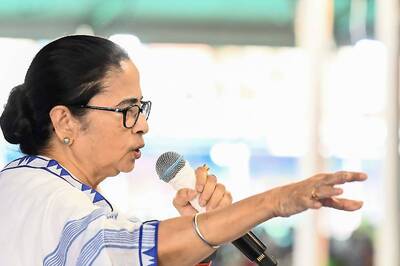
views
- Research the event’s purpose and special guests, and plan your schedule and any remarks you’ll deliver well beforehand.
- Dress a little nicer than the indicated dress code, which will help you to stand out and better represent the organization hosting the event.
- Introduce each guest, lead the audience in applause, and transition between speakers by commenting on the prior presentation and interacting with attendees.
- Stay loose and calm by taking deep breaths and speaking slowly, and embrace any hiccups that might occur, rather than acting out in response.
Study the event itinerary and who’s attending.

Familiarize yourself with the nature of the event. Knowing your event is important for all types of ceremonies, whether it’s a wedding, graduation, bar mitzvah, celebrity roast, etc. The type of event will dictate the type of atmosphere you, the MC, need to create. If possible, meet with the people organizing the event and go over the planned structure and itinerary of the event in detail. Knowing what’s going on at any given moment, what should be talked about and what is coming next is key to being a successful MC.
Confirm your responsibilities with the organizers.

Talk to an organizer to clarify your duties as the host. The MC is responsible for creating and sustaining the intended atmosphere throughout the event, but often has other responsibilities. As MC, your main responsibilities include: Making sure the event stays on-schedule. Keeping the audience engaged. Introducing speakers and making them feel valued. Transitioning between speakers and presentations. Serving as a central figure and representative of the organization hosting the event.
Do your research on key event guests.

Acquire and study a guest list or roster from the event organizers. Contact or research your key speakers to find out some background information on them. Use that information to prepare introductions for the speakers that are more personal and genuine. Find out if there are any special audience members who should be recognized during the event. Make sure you review everyone’s name and title so you know how to say it on stage when the time comes to make their announcement. EXPERT TIP Stefanie Chu-Leong Stefanie Chu-Leong Owner & Senior Event Planner, Stellify Events Stefanie Chu-Leong is the Owner and Senior Event Planner for Stellify Events, an event management business based in the San Francisco Bay Area and California Central Valley. Stefanie has over 15 years of event planning experience and specializes in large-scale events and special occasions. She has a BA in Marketing from San Francisco State University. Stefanie Chu-Leong Stefanie Chu-Leong Owner & Senior Event Planner, Stellify Events Our Expert Agrees: Do your research and learn all of the details about your speakers that will boost your confidence and make you a better MC. Start by learning everyone's names and how to pronounce them.
Write out a rough script and an approximate schedule.

Create an agenda for the event and review, minute by minute, the event schedule. In addition, prepare some notes or a bulleted script for what you’ll say—you don’t need to plan every word, but it helps to have a structure or script to follow throughout the event. Take into consideration the time it takes to get on and off the stage, make introductions for guests, and speeches or thank yous from guest members. Create small notecards to keep yourself on task, or have an outline projected throughout the event for you to follow. It may be helpful to tell the lead organizer of the event that, as MC, you’re only going to answer to one person in charge in the case of complications. This will reduce misunderstandings during the event.
Tailor your stage presence to the event.

Practice public speaking before the day of the gathering. Being an MC means that you have a great sense of humor, you can work a crowd, and you’re a practiced public speaker. Memorize the major points you’ll need to hit, and consider your posture and hand gestures, which keep the audience more engaged. Also consider the event’s audience, and what sort of presenter they’d like to see—adjust your tone to be more serious or more casual accordingly. Remember to smile. Smiling reinforces the fun and lighthearted ambiance of the event, and makes you appear to be an enthusiastic MC. Keep in mind that as the MC, you are not the center of the show. You’re there to make others feel like they’re the stars of the show.
Dress a little nicer than you need to.

Ask an event organizer for the dress code, and then punch it up a bit. If an event is casual, dress in slacks and a button-up or a smart dress. If an event is semi-formal, wear a nice jacket or more elegant gown. As the MC, you’re the most-seen person there, and it’s better to overdress than underdress. Coordinate your outfit colors with the colors of the company of the organization in order to tie your presence more completely to the occasion. If possible, find out what color the stage and set dressings are, and choose an outfit that complements rather than clashes with those colors. For example, a red dress will blend in too much with red curtains, but a black dress will help you stand out.
Keep your composure on and off stage.

Smile, take a deep breath, and center yourself to remain calm. Being an MC is a lot of pressure—the event’s success is largely attributed to how well the MC keeps things on track. Thankfully, you’re the perfect person for the job. While the event’s proceedings can get hectic, it’s important to remain calm and focus on maintaining your MC persona. To keep your cool, try: Continuing on if you mess up. Roll with the punches and continue on if you make a mistake. If you continue without acknowledging the slip-up, the audience will most likely forget your misstep. Finding a spot to look at while talking. Looking at the individual audience members might make you more nervous while speaking. Instead, try looking over the heads of the audience members to reduce intimidating one on one eye contact. Slowing down your speech. Talking too quickly can lead to mispronunciations and stuttering, which can affect people understanding you. Take your time, and pause slightly in between sentences, and take a deep breath away from the microphone if you need to.
Welcome the audience and thank them for coming.

Introduce yourself and welcome the attendees in your speech. Identify the specific, principal groups of your audience (like special guests, organizers, and the audience themselves), and welcome them individually. These welcomes don’t need to be long-winded, but they do need to be authentic. Tell everyone you’re glad they came, and remind them of the purpose of the event. For example, you might say something like, “To all of our Packer fan dairy farmers who traveled all the way from Wisconsin to celebrate this anniversary with us, a warm welcome.” “I'm so pleased and humbled at the incredible turnout. It means so much to the company, and to the speakers today, that you all took time out of your day to hear what we have to say.”
Let your audience know who the speakers are.

Introduce the speakers with a brief biography and their achievements. The MC has the key responsibility of introducing speakers that come up on stage, as well as other key people at the event. The more pertinent a guest is, the more detailed and tailored your introduction of them should be. Once you have made your introduction for a speaker, lead the audience in applauding the speaker until they reach the microphone, and again after the speaker has finished their speech. To keep the event running on time, discreetly notify a speaker if they are past their assigned time. Give them a note or some kind of visual cue, such as spinning a finger pointing upward to try and communicate to “wrap it up.” “Our next guest earned her doctorate in zoology from Columbia, where she made significant strides in advancing the study of primate behavior in the wild. Please join me in welcoming Jane Smith.”
Transition smoothly between speakers.

Use anecdotes and audience interaction to bridge segments. Before the event, prepare some talking bits like remarks, anecdotes, or jokes that can be used in between segments. Try and find something funny or meaningful about the previous speaker or performance, and transition from there onto the next speaker or performance. If you find yourself in an awkward spot, try asking your audience yes-or-no questions. This keeps your audience engaged and focused, while reinforcing your command as MC. If the event is a few hours long, it’s helpful to occasionally give a short summary of the performances and presentations that have occurred during breaks in the action, and hint at or forecast what’s coming up next.
Roll with mistakes and adapt to the unexpected.

Avoid losing your cool or showing your temper if something goes wrong. A great MC is ready for anything. Live events are notorious for having slight hiccups: a server might spill a drink, the wrong music might play, or the scheduled speaker might be on their way back from the bathroom. Keep control of the event by embracing these hiccups and cracking a joke or by simply being patient. Remember that it’s not your job to reprimand someone, it’s your job to keep things running smoothly in spite of something going wrong. An MC with a negative attitude can derail an event. “I’m told our next guest is running a bit late, but will be here momentarily. In the meantime, let’s give a round of applause to the foundation, for organizing this conference…” “Pardon my shouting, but the microphone is taking a little break! We’ll skip to the video presentation while we wait for it to get back to work.”
Bid your audience farewell.

Close with a summary of the proceedings followed by thank yous. Your closing of the event should be as exciting and sincere as your opening. To close the event, the MC thanks all of the attendees, speakers, and performers. It’s good manners to also thank everyone who helped to put the event together. Summarize what took place at the event and what was learned, and bid your audience farewell. In addition, encourage the audience members to take action by being present for the next gathering, donating money, or continuing to pioneer in a certain field. Whatever it may be, encourage the audience to participate. “This evening we had the pleasure of hearing an impressive roster of experts speak on the work they’ve poured years of their lives into. I invite everyone here to support their work with a donation, or get involved yourself by volunteering.”



















Comments
0 comment